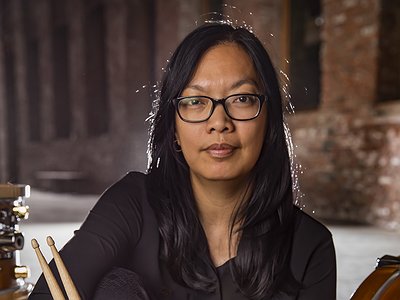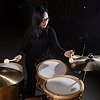Part 2
How do you make use of technology? In terms of the feedback mechanism between technology and creativity, what do humans excel at, what do machines excel at?
I enjoy collaborating with technologists. Recently I created a work in collaboration with an interactive programmer, Tommy Martinez and sound designer Justin Frye of Pioneer Works to have Xbox motion capture connected to my sounds so that a dancer/choreographer could dance and create with my percussion sounds as well as 8.1 surround sound performance. I also like to work spatially, mapping and creating sound environments in spaces.
Collaborations can take on many forms. What role do they play in your approach and what are your preferred ways of engaging with other creatives through playing together or just talking about ideas?
I love to collaborate with both artists, non-artists and scientists as well. Currently I’m working conceptually on a book with physicist Bernard Grossman on polyrhythms as seen through the lens of music, culture and physics and math. I am also working on an art and science installation piece, Himalayan Glacier Soundscapes: An Acoustic Story of Climate Change with glaciologist and geomorphologist Michele Koppes, mapping 1200 miles from source to sink two glaciers, their communities that flow along the Ganges. But I also love to collaborate with performers as a performer and composer, as well as with other artists – dancers and visual artists.
How is preparing music, playing it live and recording it for an album connected? What do you achieve and draw from each experience personally? How do you see the relationship between improvisation and composition in this regard?
Preparing music for live performance and for an album are connected but two very different things (unless you are recording a live performance). It’s like having different palettes to paint with, so I can draw from different techniques. The listening experiences for a live performance and a recording are different and I also take that into account when I create the work for each.
For me, improvisation is deeply connected to my composition. I practice both purely – i.e. I can completely improvise without score or write a score without improvisation. I often mix these techniques and to what degree depends on who is performing the music.
Our sense of hearing shares intriguing connections to other senses. From your experience, what are some of the most inspiring overlaps between different senses - and what do they tell us about the way our senses work? What happens to sound at its outermost borders?
I can’t answer this one precisely but I am interested in sensory experiences and my last album was inspired by various sensory experiences. Our sensory experiences overlap, influencing how we perceive our environment and ourselves in it. I think it’s interesting when we are able to have moments where we are aware and can shift and have an awareness that we may not have allowed ourselves to have without that sensory experience.
Art can be a purpose in its own right, but it can also directly feed back into everyday life, take on a social and political role and lead to more engagement. Can you describe your approach to art and being an artist?
Music is a way of life for me. Creative, meditative, spiritual, scientific and performance practice are all wrapped up inside it. I practice listening, and work on allowing the flow of the practice to inform its pulse, following each breath of the work. This is not always easy to do. Music has scooped me up at my lowest points and placed me back on track, as well as brought great joy and encounters I would not have ever expected.
What does it mean to be a responsible artist in today’s society? It can mean many things for different people. I am very much interested in creating beauty with music and sharing an exchange of this with communities and individuals to inspire us to be our best as human beings.
It is remarkable, in a way, that we have arrived in the 21st century with the basic concept of music and performance still intact. Do you have a vision of music and performance, an idea of what they could be beyond their current form?
Having easy access to instruments and music-making would revolutionize music.
I think even though we are in the 21st Century we have so many references from the 20th century and earlier strongly influencing a lot of music that’s made today. When will there be a significant shift in the history of music? That’s an interesting thought to think about.






